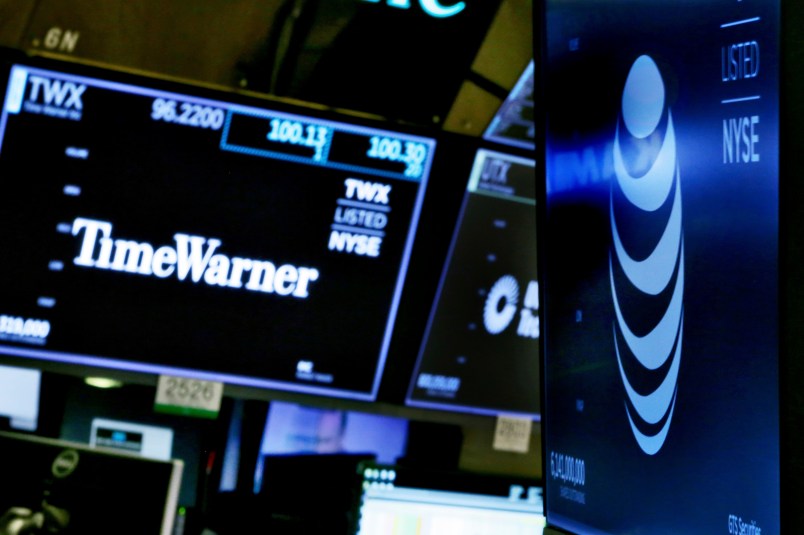WASHINGTON (AP) — A federal appeals court has cleared AT&T’s takeover of Time Warner, rejecting a challenge from the Trump administration by saying it failed to prove that the $81 billion merger won’t harm consumers or competition in the pay TV market.
The ruling by the U.S. Court of Appeals in Washington came Tuesday in the high-stakes competition case, approving one of the biggest media marriages ever. It was already completed last spring soon after a federal trial judge approved it, as phone and pay TV giant AT&T absorbed Time Warner, the owner of CNN, HBO, the Warner Bros. movie studio, “Game of Thrones,” coveted sports programming and other “must-see” shows.
Many observers had expected the decision favorable to AT&T from the three-judge appeals court panel, which upheld the trial judge’s June ruling. Opposing the merger forced the Justice Department to argue against standing legal doctrine that favors mergers among companies that don’t compete directly with each other, what’s known as a vertical merger.
The U.S. antitrust lawsuit against Dallas-based AT&T, the biggest pay TV provider in the U.S., marked the first time in decades that the government has challenged that doctrine by suing to block a vertical merger.
U.S. District Judge Richard Leon was correct to dismiss the government’s argument that the merger would hurt competition, limit choices and jack up prices for consumers to stream TV and movies, the appeals judges ruled.
The Justice Department antitrust attorneys also had asserted that Leon misunderstood the complexities of the pay TV market and the nature of AT&T’s competitors.
The idea behind the merger was to help AT&T — which claims about 25 million of the 90 million U.S. households that are pay TV customers — compete better with nimble rivals born on the internet like Netflix, YouTube and Hulu.
Soon after the deal closed, AT&T launched WatchTV, a $15-a-month streaming service that offers more than 30 TV channels, including the Time Warner channels TNT and TBS (Turner Broadcasting).
AT&T has asserted the merger will save it money on content from Turner Broadcasting, enabling it to reduce charges to its DirecTV customers by at least $78 million a year.
The case could affect the future course of antitrust regulation.
Already, Leon’s ruling opened the floodgates to deal making in the fast-changing worlds of entertainment production and distribution.
Just a day after his decision, Comcast jumped back into a bidding war with Disney for most of 21st Century Fox’s TV and movie businesses. Disney eventually won, and Comcast bought British broadcaster Sky instead. Wireless carriers Sprint and T-Mobile also are attempting to combine; the Justice Department and the Federal Communications Commission are still reviewing that deal.
When the AT&T-Time Warner deal was first made public in October 2016, it drew fire from then-candidate Donald Trump, who promised to kill it “because it’s too much concentration of power in the hands of too few.” Trump has publicly feuded with Time Warner’s CNN, calling it “failing” and a purveyor of “fake news.” The president’s statements didn’t come up during the trial in district court, though his antipathy loomed in the background.







Mixed feelings here… DOJ was right to challenge this merger (and the prior similar ones should have been prohibited, such as Comcast’s) but they clearly did it because Trump was mad at CNN, and this was payback. So it was a misuse of government power.
My guess is that this fact, clear to nearly everyone played a big part in the eventual decision.
Coming soon to a neighborhood near you
The TV Company
The Phone Company
The Online Company
Choice is for Chumps
Apparently, the judges didn’t bother to read the law. Or they live in a cave.
(Hard to believe that the Trump maladministration wanted seriously to overturn the merger.)
This time the double-negative editing mistake belongs to the AP. It should say that the Trump Administration failed to prove that the merger will harm consumers or completion. Either that or the Court of Appeals just decided to flip the basic premise of antitrust law.
I had a professor who said that the best thing was when someone would do the right thing for the right reason, but the next best thing was when someone would do that right thing for the wrong reason. The worst thing was when someone did the wrong thing for the right reason, because you couldn’t reason with him.
Trump may have acted for the wrong reason, but you are right–the merger should have been challenged, and overturned.
We need a new era of trust-busting.